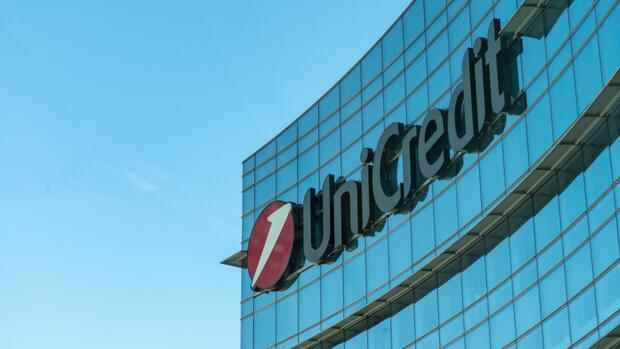Frankfurt Europe’s banks exceeded expectations in the third quarter of this year – despite the looming recession. The second largest Italian bank, Unicredit, said it was the best third quarter in at least a decade.
The industry benefits above all from rising interest rates due to the tighter monetary policy of numerous central banks. From July to September, Unicredit increased its net profit by around 60 percent to EUR 1.7 billion.
In September, the European Central Bank (ECB) raised interest rates in the euro area more than ever before. The key interest rate rose by 0.75 percentage points to 1.25 percent. The Bank of England (BoE) also raised the key interest rate in Great Britain by 50 basis points to 2.25 percent: the highest level since 2008. And the monetary watchdogs could turn the interest screw further in the near future.
Top jobs of the day
Find the best jobs now and
be notified by email.
At Unicredit, net interest income – i.e. the difference between interest income from loans granted and interest payments for customer deposits or bonds – rose by almost ten percent. It rose 11 percent at Standard Chartered and nearly 16 percent at Santander. However, Barclays benefited the most from the higher interest rates.
Fear of an economic downturn
At the British bank, net interest income rose by around 58 percent. Top European bankers keep pointing out that companies in Europe are more heavily financed than in the USA through bank loans rather than through the capital market.
>> Read also: Deutsche Bank quintuples quarterly profit – but is becoming more cautious on the return target
For investors, the quarterly figures from European banks are another important indicator of the impact of the energy crisis, the slowdown in the global economy and the increase in interest rates. The major US banks had already published their figures almost two weeks ago – and in doing so sent warning signals to Europe.
Both consumers and companies are still in good shape, said JP Morgan CEO Jamie Dimon. Nevertheless, he fears a “hurricane” on the horizon. “With inflation, rising interest rates and mortgage rates, volatile markets and the war, that will weigh on future results,” Dimon said.
For fear of an economic downturn, not only JP Morgan but also other US banks such as Citi, Morgan Stanley and Wells Fargo increased their loan loss provisions. And it is precisely this provision for possible imminent loan defaults that led to a significant drop in profits at the major US banks.
Better prospects
4.8
billion euros profit
Unicredit expects in 2022 – so far the bank had assumed a good four billion.
The US banks also benefited from rising interest surpluses. However, the continued weakening of investment banking weighs much more heavily on US institutions than on European financial institutions.
Meanwhile, Unicredit is more optimistic about the rest of the year – and even raised the forecast for the current year again. After already expecting an annual profit of four billion euros in July instead of around 3.3 billion euros previously, the major bank is now even expecting a profit of more than 4.8 billion euros. However, the Russian business is excluded from these forecasts.
Good business dynamics, a favorable interest rate environment, cost discipline and low risk costs made this step possible, said Unicredit boss Andrea Orcel. “We are looking forward to an uncertain future with confidence.” Nevertheless, the bank only increased its risk provisions by EUR 84 million, almost 72 percent less than in the same quarter of the previous year.
Increased risk provision
Like the US banks, other European banks are preparing themselves more for possible strains from defaulting loans. However, these provisions are fully offset by the sharp rise in net interest income.
“We expect the economic environment to remain challenging as markets across Europe and North America adjust to levels of inflation not seen in decades.” Santander board chief Ana Botin
The Spanish Santander, which is primarily active in the classic banking business, increased the provisions for possible loan defaults by 24 percent. “We expect the economic environment to remain challenging as markets across Europe and North America adjust to levels of inflation not seen in decades,” said Santander CEO Ana Botin.
The British Barclays also made additional provisions of around 440 million euros. Barclays boss CS Venkatakrishnan said they are ready to support customers who are facing an uncertain economic environment and higher cost pressures.
Investment Manager John Moore of RBC Brewin Dolphin said the uncertain economic environment is likely to weigh on some of Barclays’ markets going forward, including its credit card business. However, the bank is still benefiting from the volatile environment on the financial markets. In its trading department, the bank doubled its income within a year to around 1.85 billion euros.
Competitor Standard Chartered has also more than doubled its risk provisions. The London-based money house generates most of its revenue in Asia. The German financial regulator Bafin recently complained about deficiencies in the German subsidiary of the British financial institution. Accordingly, a special audit showed “that the correctness of the business organization was not given in all audited areas,” according to the authority.
The bank then announced that it was “fully cooperating with the Bafin”. “We take the Bafin’s complaints very seriously and will ensure that all business processes and processes at Standard Chartered Bank AG fully meet the regulatory requirements,” the statement continues.
Despite the overall uncertain market environment, Standard Chartered CEO Bill Winters remains committed to the goals: “We remain confident that we will achieve our financial goals for 2024,” he said.
More: More interest, more bankruptcies – banks are gearing up for hard times
